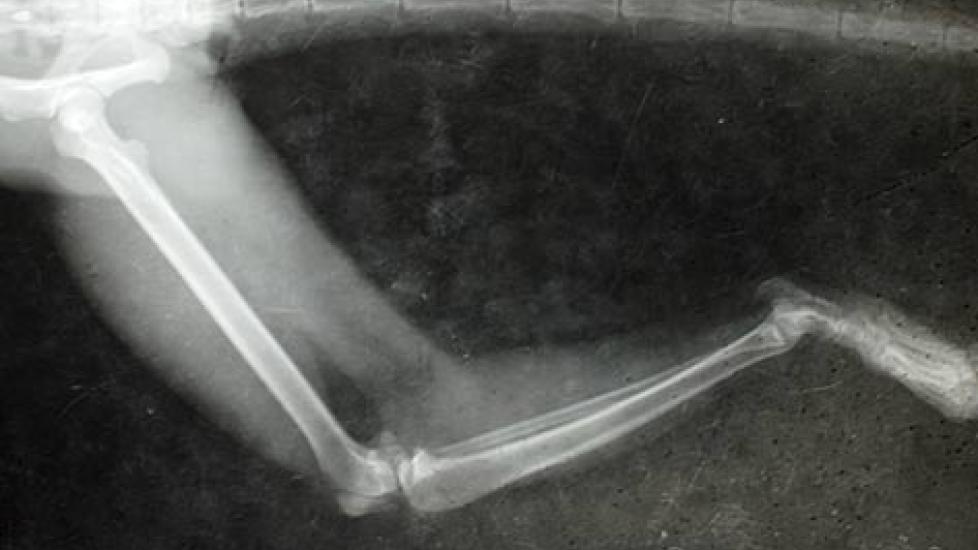Fractured Bone in Reptiles
Bone Fractures in Reptiles
No matter how well you care for your pet reptile, it may break or fracture a bone. These fractured or broken bones can occur anywhere in its body, including the pelvis, neck, legs, spine, or tail.
Causes
Even when fractures in the bone are directly related to an accident, the underlying cause for the weakness in the bone will need to be assessed. Often, bone weakness is due to metabolic bone disease. Your reptile's diet, nutritional status, and living environment are the most important considerations for evaluating bone health.
Metabolic Bone Disease, also known as MBD, is an extremely serious and often fatal disease for reptiles. It is caused either by a lack of calcium in the reptile’s diet or inadequate exposure to UVB light.
Symptoms and Types
Spinal injuries to the tail can often be non-threatening, but an injury located between the skull and tail can cause problems in nervous system and muscle function, including the muscles in the intestinal walls. Constipation due to loss of intestinal mobility will result in the reptile not being able to expel uric acid salts from its body.
Breaks in the limbs, i.e., long-bone fractures, will often be apparent, as the affected reptile will favor the injured leg when moving.
Pelvic and spinal injuries can leave reptiles paralyzed in the lower body.
Diagnosis
Aside from making a presumptive diagnosis based on observation, any broken bone or fracture in your reptile will need to be confirmed through X-rays taken by a specialized reptile veterinarian.
Treatment
Long-bone fractures may be repaired with support or through surgery. The simplest way of supporting such an injury is to tape the reptile’s fractured leg to a splint until it has healed. In some cases, for long-bone fractures, the broken bone will need to be surgically repaired—such as with plates and pins—but this treatment is mostly limited to larger reptiles (with larger bones) and is always determined by the reptile's nutritional status and how strong its bone health is.
In some cases, such as with severe breaks or when infection has set in, the affected limb will need to be amputated. Most reptiles will adjust to their changed bodies and go on to live the rest of their lives otherwise normally.
Bone fractures in reptiles need time to heal—much longer than with warm blooded mammals. Depending on the severity of the break and your reptile's nutritional status, the bone can take from a few months to over a year to heal completely. Because of this, reptiles that suffer from bone or spinal injuries must be given special care. One of the ways in which this is accomplished is by changing your reptile's habitat—typically by providing low branches and shallow water dishes for ease of movement. You may also want to limit the injured reptile's contact with other reptiles to protect your reptile from too much activity. Needless to say, cage rest is a must while your reptile is rehabilitating.
Home Care and Prevention
Fractures most often occur as a result of metabolic bone diseases. Improving the diet with vitamins and mineral supplements (e.g., calcium powder), as well as providing the essential amount of UVB light can help to avoid bone diseases in your reptile.
Sunlight, or precisely, UVB light, is a primary source for Vitamin D3. That is, the UVB rays in direct sunlight cause the body to synthesize cholesterol in the body, creating Vitamin D3, which has a direct impact on metabolism and calcium balance. Calcium is extremely important for bone health. Prevent calcium imbalance by dusting a bit of calcium powder over your reptile's food two to three times a week.
Always provide exposure to sunlight and/or UVB light. This can be easily achieved with a reptile light placed over your reptile's habitat. Place the light so that it is far enough not to burn your reptile, but without anything in between to block the rays; UVB wavelengths cannot pass through glass, plexiglass,or clear plastic. If you see symptoms of Metabolic Bone Disease (MBD) in your reptile, see your herpatology or exotic animals veterinarian immediately.
